- News
- Reviews
- Bikes
- Accessories
- Accessories - misc
- Computer mounts
- Bags
- Bar ends
- Bike bags & cases
- Bottle cages
- Bottles
- Cameras
- Car racks
- Child seats
- Computers
- Glasses
- GPS units
- Helmets
- Lights - front
- Lights - rear
- Lights - sets
- Locks
- Mirrors
- Mudguards
- Racks
- Pumps & CO2 inflators
- Puncture kits
- Reflectives
- Smart watches
- Stands and racks
- Trailers
- Clothing
- Components
- Bar tape & grips
- Bottom brackets
- Brake & gear cables
- Brake & STI levers
- Brake pads & spares
- Brakes
- Cassettes & freewheels
- Chains
- Chainsets & chainrings
- Derailleurs - front
- Derailleurs - rear
- Forks
- Gear levers & shifters
- Groupsets
- Handlebars & extensions
- Headsets
- Hubs
- Inner tubes
- Pedals
- Quick releases & skewers
- Saddles
- Seatposts
- Stems
- Wheels
- Tyres
- Health, fitness and nutrition
- Tools and workshop
- Miscellaneous
- Tubeless valves
- Buyers Guides
- Features
- Forum
- Recommends
- Podcast
feature
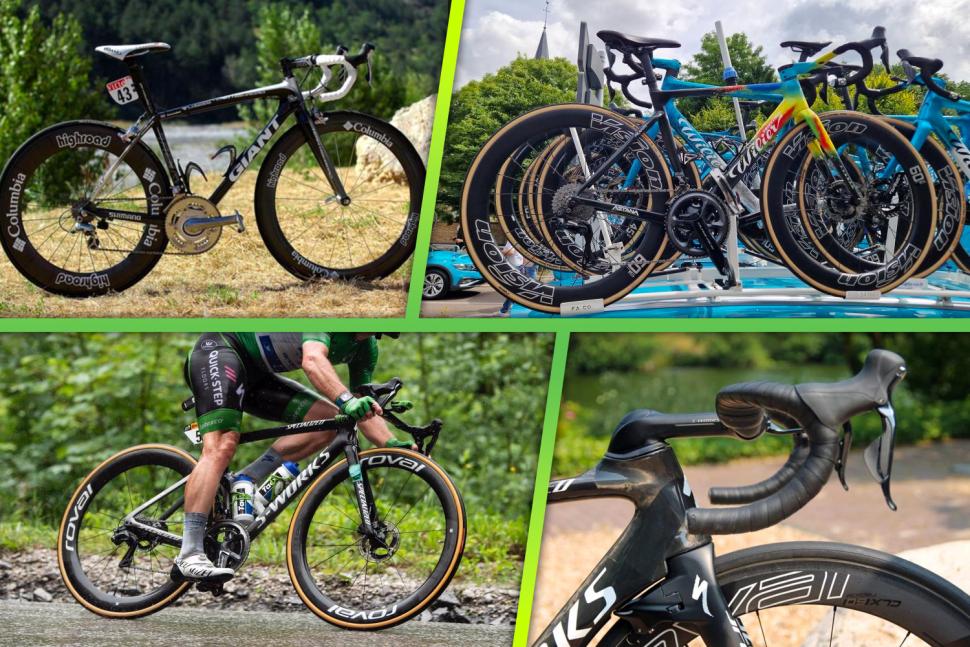 Mark Cavendish's Tour de France stage-winning bikes July 2024
Mark Cavendish's Tour de France stage-winning bikes July 2024Mark Cavendish's Tour de France stage-winning bikes — from Giant to Wilier, every bike the Manx Missile rode to his record-breaking 35 Tour stage wins
Sir Mark Cavendish has become the greatest ever stage winner at the Tour de France, from his early wins predating disc brakes, aero bikes, and electronic gears, to his record-breaking 35th victory in 2024 on a bike with features unimaginable to most cyclists in the late 2000s. Let's take a look at some of the very interesting and significant developments in road bike design spanning more than a decade.
Sir Mark Cavendish claimed his first Tour de France stage win way back in 2008, and he surpassed Eddy Merckx to become the greatest ever stage winner, with a victory on stage 5 of this year's Tour.
It was touch-and-go whether that would happen on the brutal opening stage of the 2024 Tour, as the freshly knighted Cavendish struggled in the brutal Italian heat; but like his long and storied career, he battled through and defied the odds by coming home 10 minutes inside the time limit.
Cav's long and remarkable career has been a showcase of cycling technology evolution, as evidenced by his stage-winning bikes spanning over a decade. He has won Tour de France stages for six different WorldTour teams in his professional cycling career, and 2024 marks his 19th and final year in the pro peloton, riding for Astana Qazaqstan.
These transitions to different teams have seen him riding 10 different race bikes over the years, seven of which have been ridden to a stage win at the Tour de France. For his most recent - and final - Tour victory, Cavendish was riding a Wilier Filante SLR with a fresh special edition heat map-inspired paint job. So, how does this compare to his first race bike, a Giant TCR Advanced SL?
2008: Giant TCR Advanced SL
- Team: Team High Road
- Stage wins: Four
A Giant TCR Advanced was Cavendish's first race bike back in 2005, but the German-registered T-Mobile team changed their name to Team High Road in 2008. With this came a new kit and a new version of the TCR Advanced.
The Tour de France is no stranger to prototype bikes, and the bike Cavendish used for his first Tour de France stage victory was a prototype Giant TCR Advanced SL, known for its lighter weight and increased stiffness compared to its predecessor, the TCR Advanced.
It had a non-aero frame equipped with the latest Shimano groupset at the time - Dura-Ace 7800 - which was 10-speed mechanical and considered by many to be the best groupset ever made at the time.
Despite only being at this Tour for the first 13 stages before leaving early to concentrate on training for the 2008 Olympics, Cavendish rode this bike to four stage wins.
2009 and 2010: Scott Addict
- Team: Columbia-HTC
- Stage wins: Six (2009), five (2010)
Moving away from his trusty Giant, Cavendish headed into 2009 on a Scott Addict, one of the lightest road bikes you could buy at the time with a sub-1kg frame.
Designed to be as light and stiff as possible, this was Scott's most highly advanced carbon race bike at the time. Team Columbia-HTC used the standard Addict frame and fork.
Most of the team's sponsors remained the same, so Cavendish continued to use Dura-Ace wheels and a Dura-Ace 7800 groupset, despite the latest generation Dura-Ace 7900 being released mid-season.
The bike was clearly good and so was Cavendish, riding to six stage wins in 2009, his highest number of stage wins at one Tour.
2010 saw Cavendish at the same team aboard the same bike, and he added a further five stage wins to his palmares.
2011: Specialized McLaren Venge
- Team: HTC-Highroad
- Stage wins: Five
For his final season with HTC-Highroad in 2011, Cavendish transitioned to an aero-optimised race bike developed with McLaren over five years.
The newly-released Specialized McLaren Venge was Specialized's flagship aero machine, a bike made for speed that was a sign of things to come over the next decade.
Another big change this year was the switch from mechanical shifting to an electronic groupset, with Cavendish riding Shimano's 2009 Dura-Ace Di2 groupset offering enhanced shifting performance.
> What are the Tour de France pros sitting on?
Teams these days are more selective with their sponsors, with many groupset manufacturers also providing the wheels and finishing kits. This wasn't the case for Cavendish in 2011, and he had a lot going on with a Shimano Dura-Ace groupset and hub, Zipp rims (Zipp was already owned by SRAM, a rival to Shimano, at this stage), SRM power meter and an oversized stem and handlebars from PRO.
This combination must have worked for Cav as it was another successful year for him, picking up five stage wins and the green jersey at the Tour de France and becoming World Champion on the road.
2012: Pinarello Dogma
- Team: Team Sky
- Stage wins: Three
> Check out Mark Cavendish's 2012 Pinarello Dogma 2
In 2012, Cavendish rode to three Tour de France stage victories alongside Bradley Wiggins, who became the first British rider to win Tour de France. Riding for Team Sky, Cav's bike was a Pinarello Dogma 2 rather than the Dogma 65.1 that was launched just before the start of the Tour de France.
The most distinctive features of this bike were the wavy chainstays, seatstays and fork legs, that Pinarello said resulted in improved vibration damping.
Cavendish's bike was equipped with Shimano Dura-Ace Di2 7970 and an SRM power meter. The wheels are Shimano Dura-Ace too, in the form of the C50 tubulars.
His saddle of choice was the Fizik Arione CX with braided carbon rails, and you'll also notice the rainbow bands on the frame announcing Cav’s status as World Champion.
2013: Specialized McLaren Venge
- Team: Omega Pharma-Quickstep
- Stage wins: Two
> Mark Cavendish’s Specialized S-Works race bikes : 2014 Venge vs 2021 Tarmac SL7
2013 saw Cav reacquainted with the Specialized McLaren Venge, riding for the Belgian Omega Pharma-Quickstep team and winning two stages of the Tour de France, as well as a British national title that year.
The Venge had only been launched two years earlier so the frame itself was the same, but as the team had different sponsors, much of the equipment was different.
Going back to a mechanical groupset, Cavendish was now using SRAM Red rather than Shimano Dura-Ace Di2, coupled with a Quarq power meter rather than SRM. He was using Zipp wheels and a Zipp stem, switching from his signature PRO stem.
2015: Specialized Venge ViAS
- Team: Etixx Quick-Step
- Stage wins: One
Cavendish crashed out of the Tour de France in 2014, but returned in 2015 to win one stage.
Still riding for the Belgian super-team Quickstep, Cav now rode a Specialized Venge ViAS. It wasn't everyone's cup of tea, but was a big leap forward in aerodynamics compared to most road racing bikes we'd seen before it. This was Specialized's all-out pursuit of making the fastest bike possible.
It had custom brakes and an integrated front-end, with Specialized claiming it was 120 seconds faster than a Tarmac SL4 over 40km. Some riders found the brakes difficult to set up, although we had no complaints about the stopping power when we reviewed the bike.
The Venge ViAS was complete with a Shimano finishing kit and Specialized's Roval Rapide CLX60 wheels. Cav was also back using Shimano Dura-Ace Di2 with an SRM power meter.
2016: Cervelo S5
- Team: Dimension Data
- Stage wins: Four
> Check out the Cervelo S5 that Mark Cavendish rode to four Tour de France stage wins in 2016
In 2016, Cavendish rode for Team Dimension Data aboard a Cervelo S5. With it came four stage wins and a day in the yellow jersey.
Cervelo pioneered aero road bikes, launching the Soloist way back in 2002, and the current S5 is claimed to be one of the fastest aero bikes ever made.
The brand created an aero-optimised carbon handlebar specifically for the S5, known for significantly reducing drag. However, Cavendish opted not to use it, instead choosing a Pro bar with logos covered in electrical tape
It was complete with Enve wheels and stem, a Dura-Ace Di2 groupset (the 9070 series) and Rotor’s 3D Power chainset with 170mm crank arms and noQ round chainrings.
2021: Specialized Tarmac SL7
- Team: Deceuninck Quickstep
- Stage wins: Four
> Custom Specialized S-Works Tarmac SL7 staff race bike
Returning to his former Quickstep team in 2021, Cavendish reunited with Specialized, this time riding the Tarmac SL7. This bike incorporated aero elements from the Venge but in a significantly lighter design.
Cavendish first raced on a disc brake bike, the BMC TimeMachine, in 2019, but it was in this period that he secured his first stage win on a disc brake-equipped bike.
It was in this year that Cavendish achieved one of cycling's and sport's greatest comebacks, securing four stage wins to equal Merckx's record of 34 Tour de France victories.
Cavendish’s bike was fitted with a Shimano Dura-Ace R9100 11-speed groupset. Even though the 12-speed, semi-wireless Shimano Dura-Ace 9200 was released that same summer, the 11-speed version is still a huge step change from the 10-speed mechanical groupset he started on over a decade earlier.
Specialized also provided the team with wheels, and Cavendish used Roval Rapide CLX. Also from Specialized is the S-Works Power with Mirror saddle.
2024: Wilier Filante SLR
Team: Astana Qazaqstan
Stage wins: One
> The bikes of the Tour de France
Sadly, Cav was forced to abandon the Tour in 2023 while riding a Wilier Filante SLR with a custom finish. However, he returned for one more year in 2024 sporting another Wilier Filante SLR with a fresh special edition heat map-inspired custom paint job.
Astana went all in for Cav at this year's Tour, resulting in Cavendish and the team securing a stage victory on stage 5, surpassing Eddy Merckx's record of 34 stage wins with 35. However, with no final stage on the Champs-Élysées in 2024, Cavendish's chance for another stage win ended there after Biniam Girmay, Dylan Groenewegen and Jasper Philipsen sweeped up the other sprint stages going begging.
As for the bike, the paint job pays homage to Cav's career, featuring his green and yellow jerseys, world championship colours, and the Astana team blue. The custom paint covers the front of the frame, forks, and integrated cockpit.
It's fitted with Shimano's Dura-Ace 12-speed groupset, compared with a 10-speed mechanical groupset he started on in 2008. Vision provides the team with wheels and Cavendish uses the Metron 60 SL wheelset. Those wheels are equipped with Vittoria tyres and Cav uses a Prologo saddle.
Which of Cav's Tour de France stage-winning bikes is your favourite? Let us know in the comments section below...
Emily is our track and road racing specialist, having represented Great Britain at the World and European Track Championships. With a National Title up her sleeve, Emily has just completed her Master’s in Sports Psychology at Loughborough University where she raced for Elite Development Team, Loughborough Lightning.
Emily is our go-to for all things training and when not riding or racing bikes, you can find her online shopping or booking flights…the rest of the office is now considering painting their nails to see if that’s the secret to going fast…
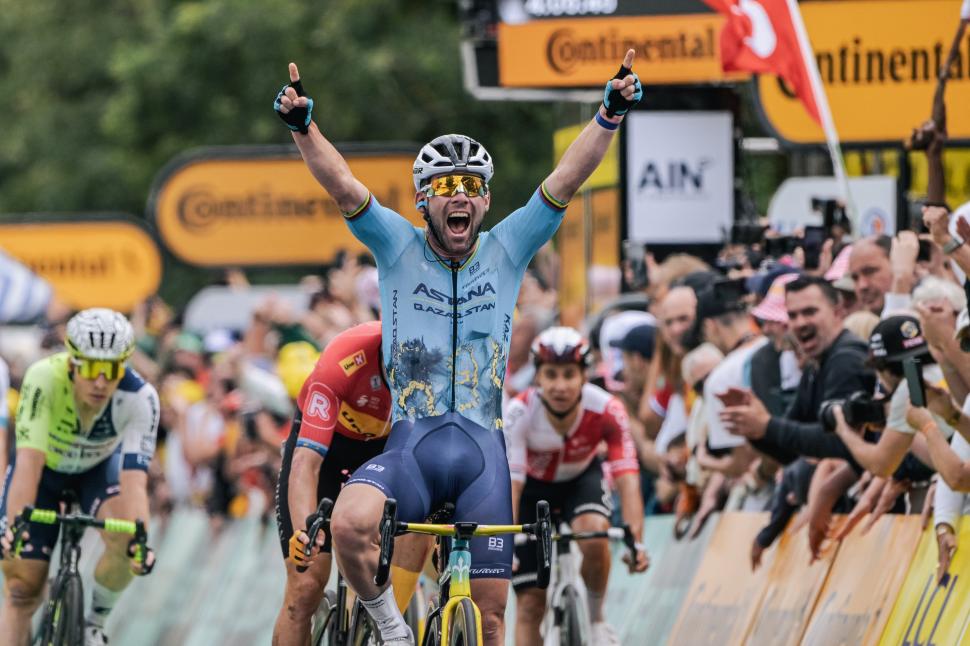
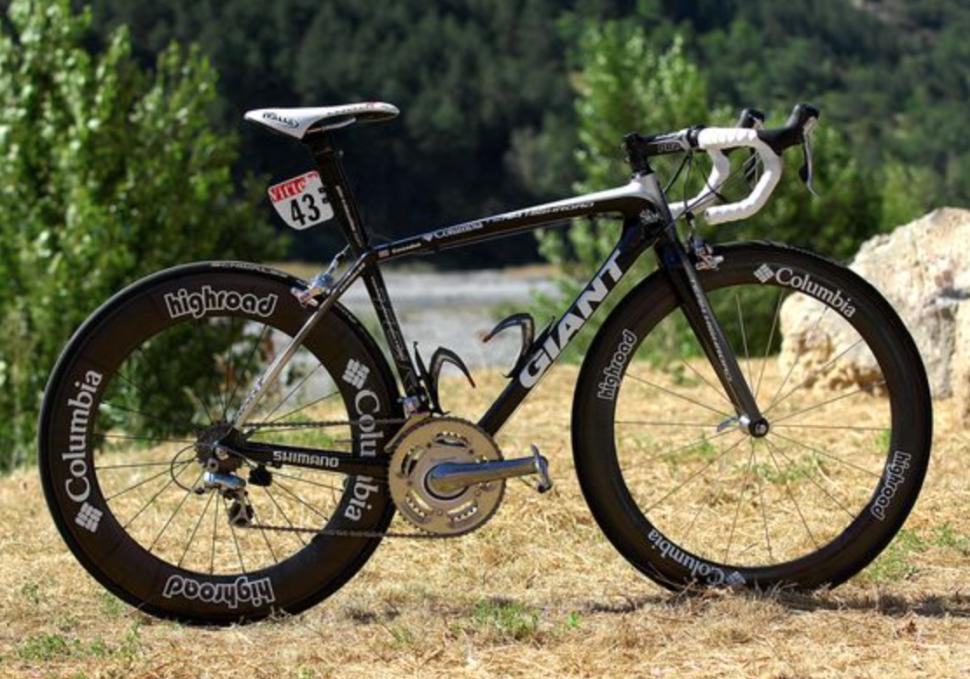
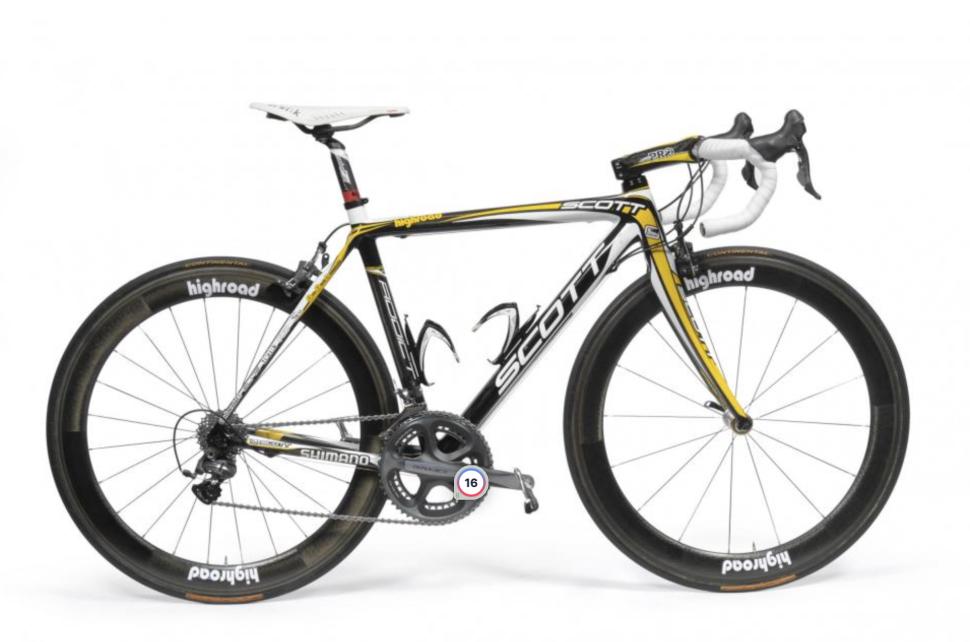
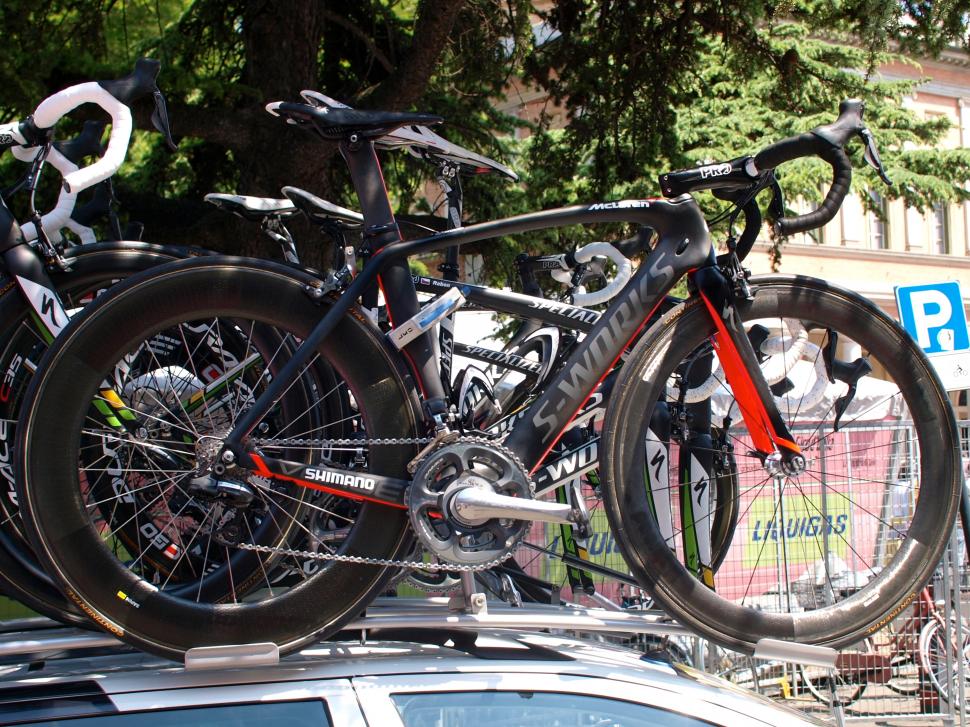
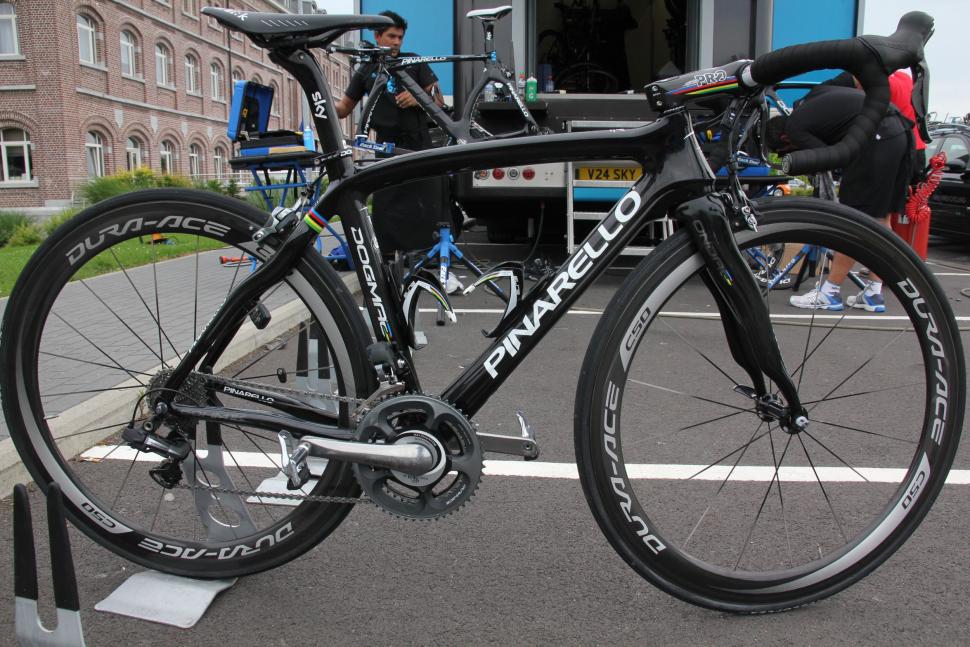
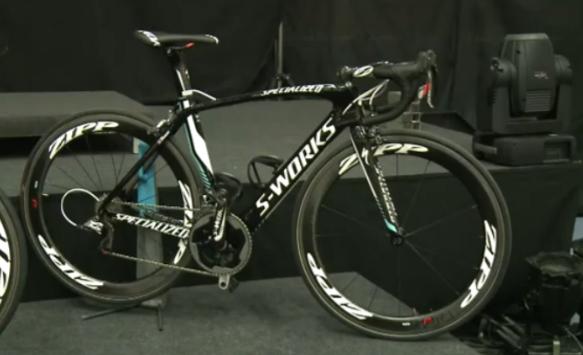
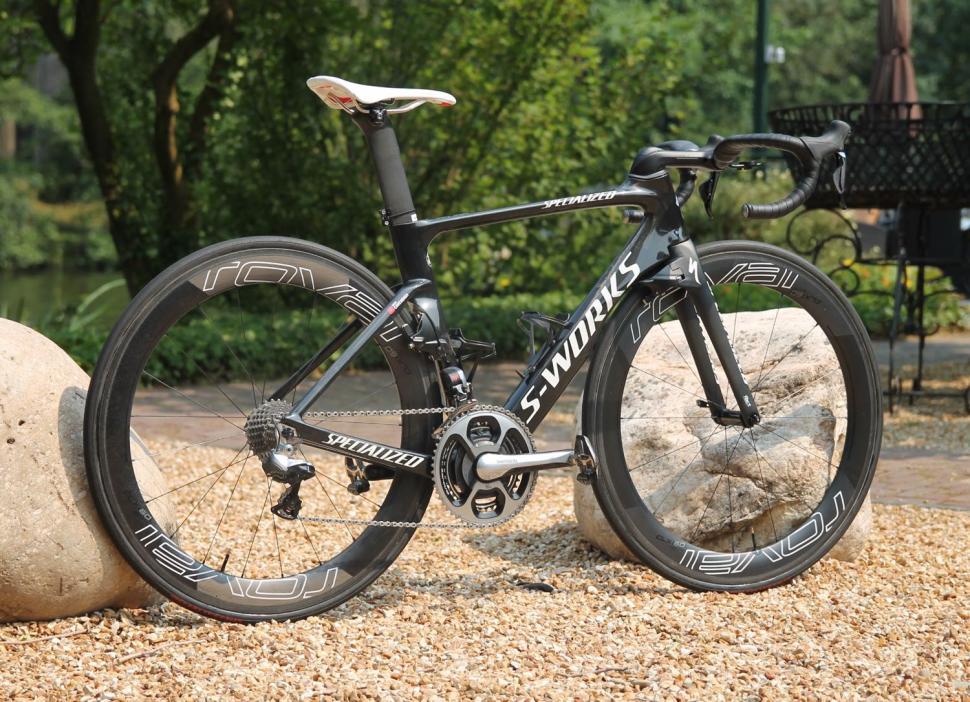
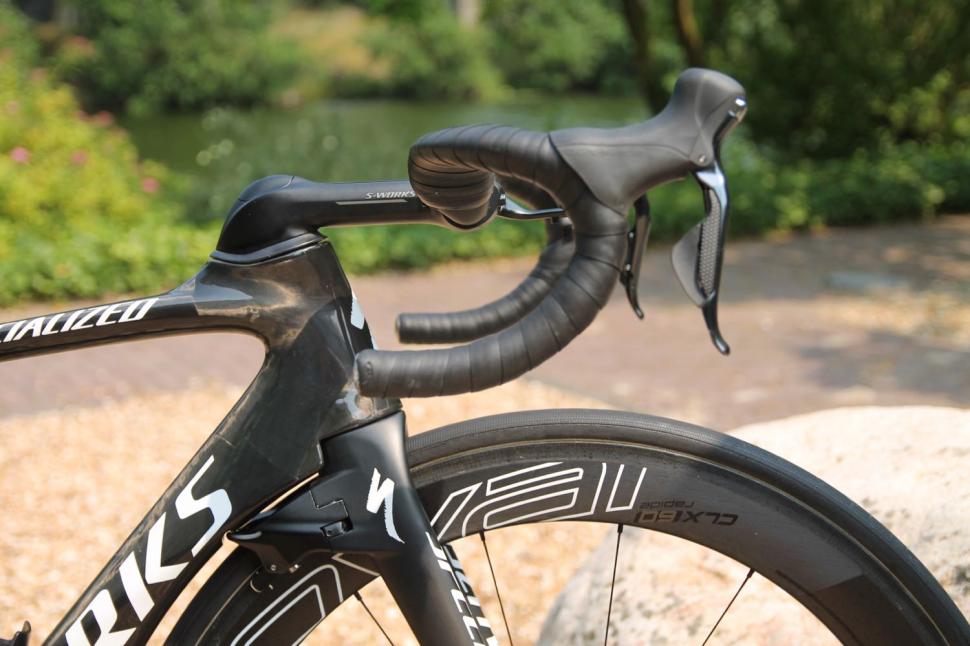
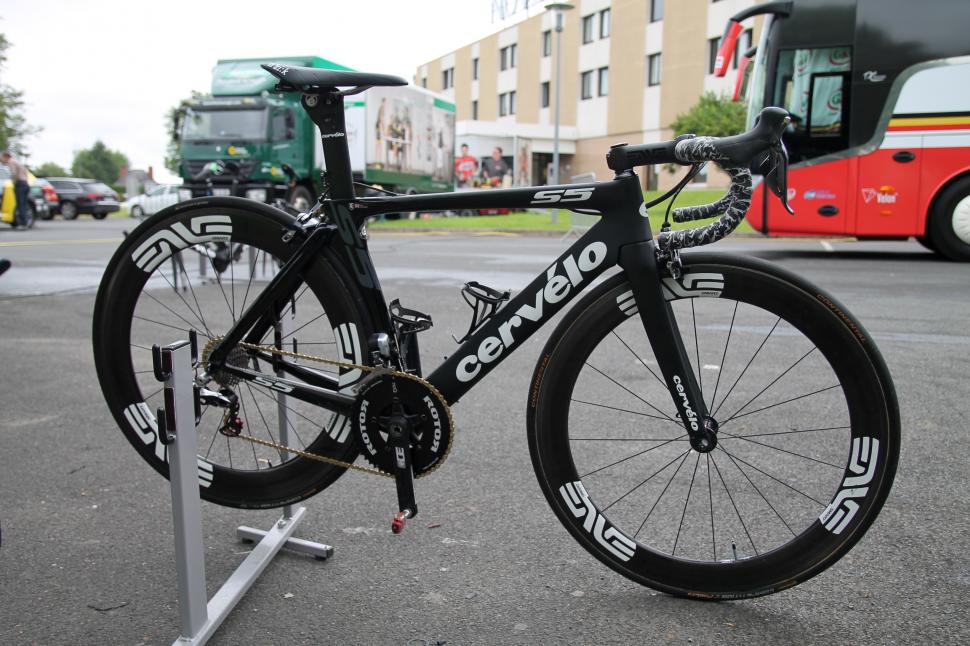
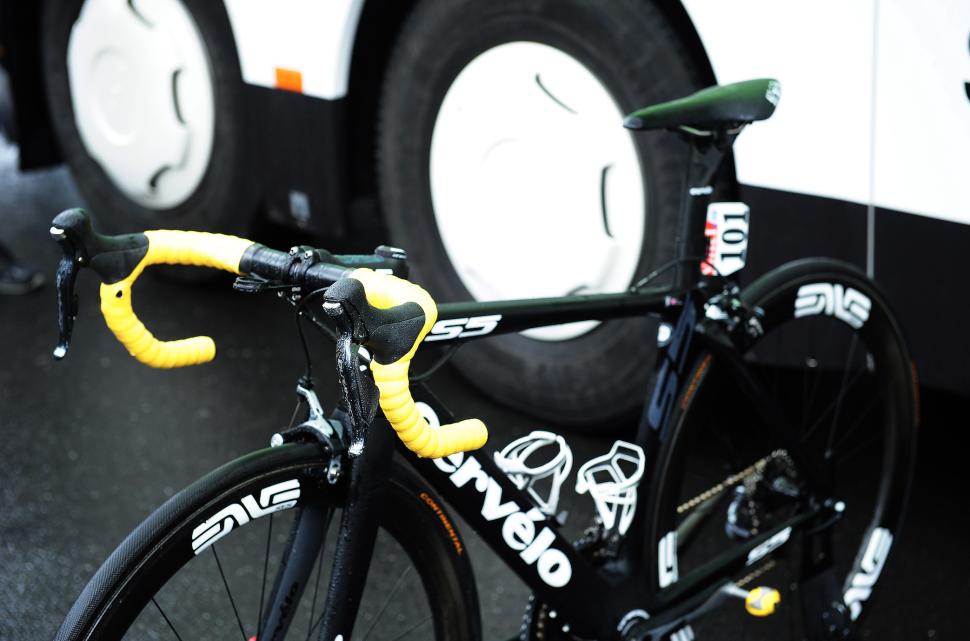
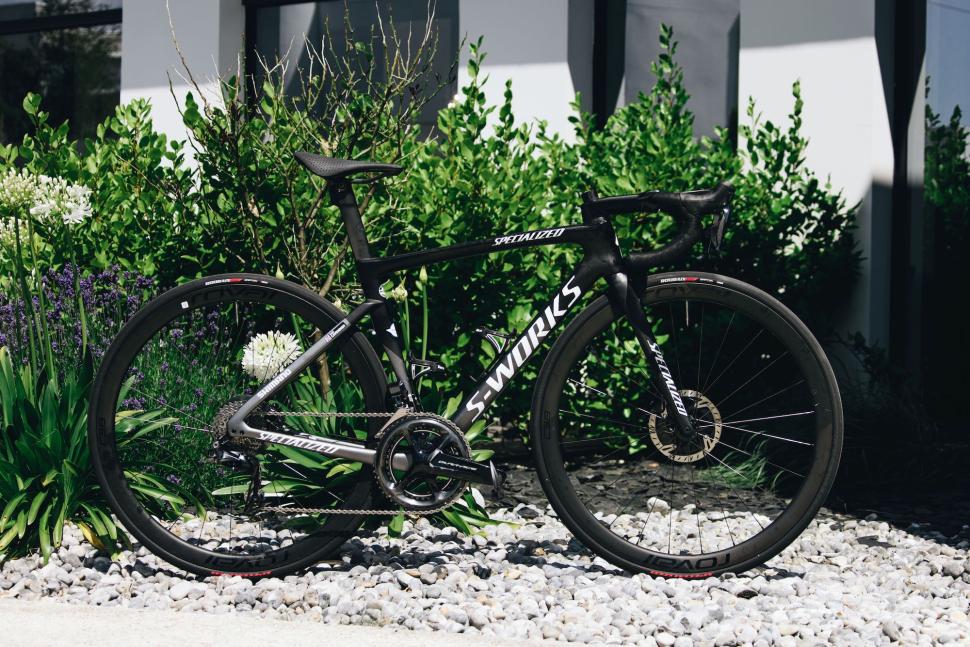
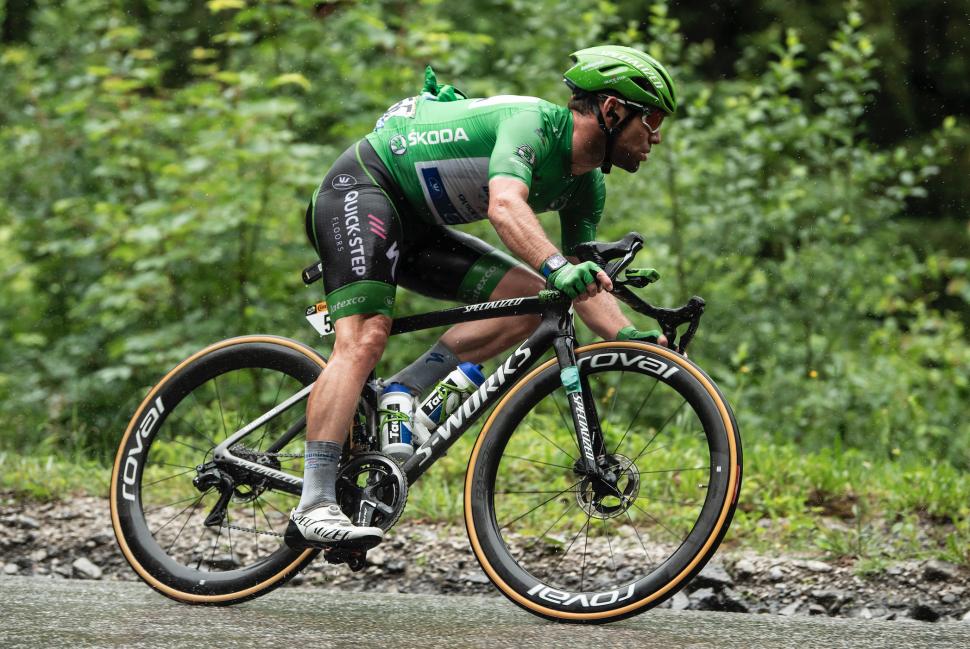
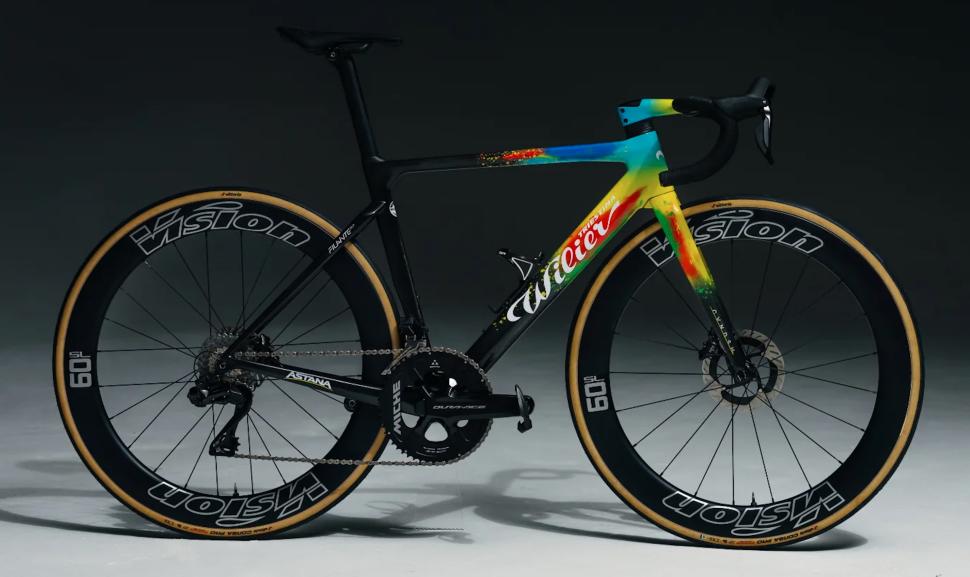
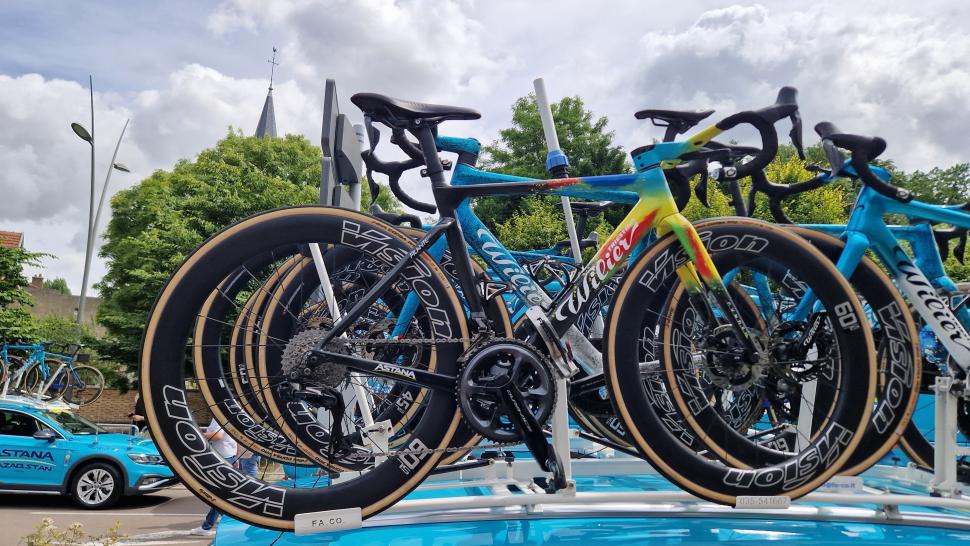
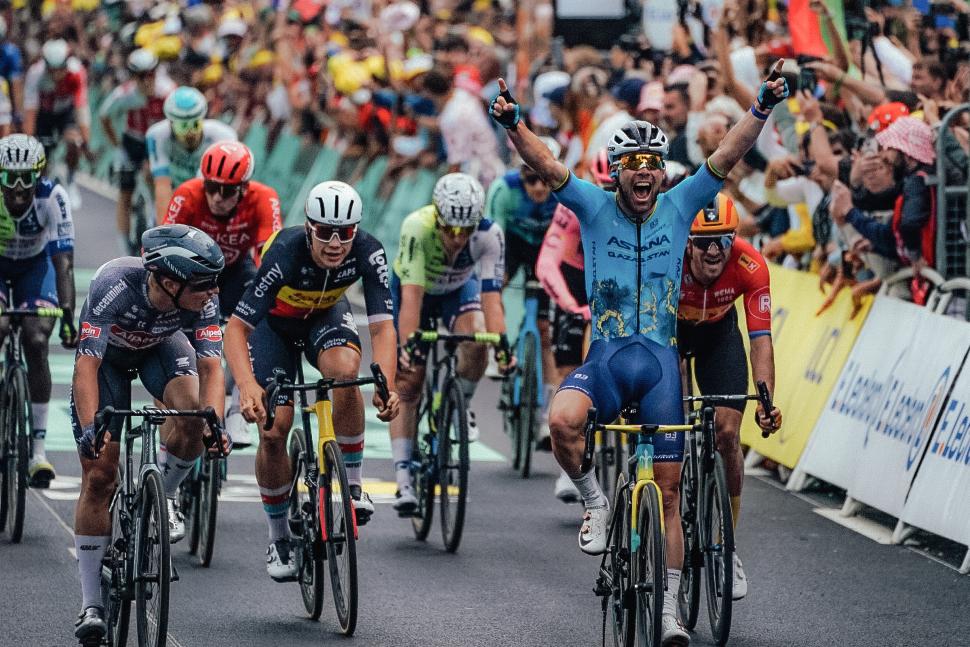
And a Happy Christmas to you, road.cc staff!
The odds of not being able to find a single pedestrian - just one, note, "any pedestrian" - in an area containing more than about ten of them who...
It's actually not too bad at the moment. I suspect the shared sections will become a nightmare in summer though. It stops before it gets into the...
I love how wannabe racer reviewers talk about fork flex under braking like their tyres are made of glue. I find traction gives long before fork flex.
All children should be locked in their rooms with a playstation to avoid causing a nuisance to the NIMBYs, curmudgeons and gammons. When they get...
They don't make them like they used to
Thanks for using my picture of chocolate in your opening picture. The original can be found here, chocolate! | LongitudeLatitude | Flickr.
Fair comments. I'll put my hands up and say I got the wrong end of the stick with this one. ¡Feliz navidad! Here's a pic for the season of goodwill.
A trip down memory lane (or street) for me - Harry Quinn's bike shop was at the top of our Street and I used to spend time staring at the bikes and...
Because people aren't buying those cars. They are effecively renting them on PCPs or via companies. The bike market doesn't work like that.